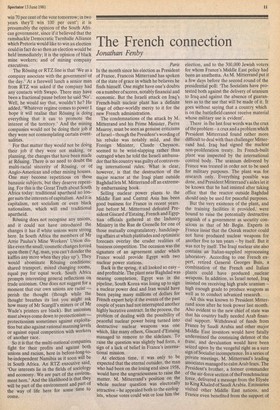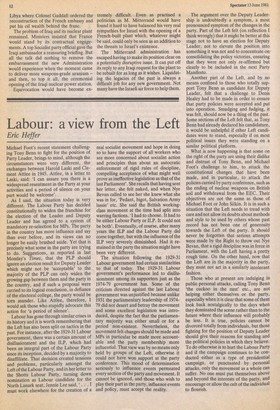The French connection
Jonathan Fenby
Paris In the month since his election as President of France, Francois Mitterrand has spoken of the state of grace in which he believes he finds himself. One might have one's doubts on a number of scores, notably financial and economic. But the Israeli attack on Iraq's French-built nuclear plant has a definite tinge of other-worldly mercy to it for the new French administration.
The condemnations of the attack by M.
Mitterrand and his Prime Minister, Pierre Mauroy, must be seen as genuine criticisms of Israel – though the President's wording of his rebuke was notably mild, and the Foreign Minister, Claude Cheysson, seemed to be wrist-slapping rather than outraged when he told the Israeli ambassador that his country was guilty of contravening international rules. What is clear, however, is that the destruction of the major reactor at the Iraqi plant outside Baghdad lets M. Mitterrand off an extremely embarrassing hook.
Selling nuclear power plants to the Middle East and Central Asia has been good business for France in recent years. Just before M. Mitterrand defeated President Giscard d'Estaing, French and Egyptian officials gathered at the Industry Ministry in the Rue de Grenelle for one of those mutually congratulatory, handclasping affairs at which platitudes and optimistic forecasts overlay the cruder realities of business competition. The occasion was the signature of an agreement under which France would provide Egypt with two nuclear power stations.
Back in the spring, it all looked so easy – and profitable. The plant near Baghdad was nearing completion, Egypt was in the pipeline, South Korea was lining up to sign a nuclear power deal and Iran would have been paying many millions of dollars for French expert help if the events of the past couple of years had not interrupted another highly lucrative contract. In the process, the problem of dealing with the possibility of peaceful nuclear power being turned into destructive nuclear weapons was one which, like many others, Giscard d'Estaing managed to remove to the sidelines. To raise the question was slightly bad form, a sign of a lack of belief in France's international mission.
At election time, it was only to be expected that the eternal outsider, the man who had been on the losing end since 1958, would have the ungraciousness to raise the matter. M. Mitterrand's position on the whole nuclear question was electorally attractive – he appealed both to the ecologists, whose votes could win or lose him the election, and to the 300,000 Jewish voters for whom France's Middle East policy had been an anathema. As M. Mitterrand put it a few days before the second round of the presidential poll: `The Socialists have protested both against the delivery of uranium to Iraq and against the absence of guarantees as to the use that will be made of it. It goes without saying that a country which is on the battlefield cannot receive material whose military use is evident'.
There in ihe last four words was the crux of the problem – a crux and a problem which President Mitterrand found rather more difficult to deal with than challenger Mitterrand had. Iraq had signed the nuclear non-proliferation treaty. Its French-built plant was inspected by the international control body. The uranium delivered by France was treated in order not to be used for military purposes. The plant was for research only. Everything possible was done, and President Mitterrand's aides let it be known that he had insisted after taking office that the reactor outside Baghdad should only be used for peaceful purposes. But the very existence of the plant, and the training facilities it provided, were bound to raise the potentially destructive anguish of a government as security conscious as that of Mr Begin. Experts in France insist that the Osirak reactor could not have produced nuclear weapons for another five to ten years – by itself. But it was not by itself. The Iraqi nuclear site also contains an Italian-supplied reprocessing laboratory. According to one French expert, retired General Georges Buis, a combination of the French and Italian plants could have produced ,nuclear weapons. In addition, as Israel noted, Iraq insisted on receiving high grade uranium – high enough grade to produce weapons as well as to conduct advanced research.
All this was known to President Mitterrand soon after he took power last month. Also evident to the new chief of state was that his country badly needed Arab financial support. Withdrawal of funds from France by Saudi Arabia and other major Middle East investors would have fatally undermined the continuing defence of the franc, and devaluation would have been seized upon by the vengeful right as a sure sign of Socialist incompetence. In a series of pnvate meetings, M. Mitterrand's leading associates managed to calm Arab fears. The President's brother, a former commander of the air-force section of theFrenchnuclear force, delivered a message from the Elyste to King Khaled of Saudi Arabia. Emissaries visited other Middle East nations, and France even benefited from the support of Libya where Colonel Gaddafi ordered the reconstruction of the French embassy and put his oil wealth behind the franc.
The problem of Iraq and its nuclear plant remained. Ministers insisted that France would stand by its contractual engagements. A top Socialist party official gave the Iraqi ambassador a reassuring briefing. But all the talk did nothing to remove the embarrassment the new Administration would experience when the moment came to deliver more weapons-grade uranium — and then, to top it all, the ceremonial opening of the Iraqi nuclear power station.
Equivocation would have become ex tremely difficult. Even as practised a politician as M. Mitterrand would have found it hard to have balanced his very real sympathies for Israel with the opening of a French-built plant which, whatever might be said, could only be seen as an addition to the threats to Israel's existence.
The Mitterrand administration has escaped having to make its position clear on a potentially disruptive issue. It can put off its reply to any Iraqi request for the plant to be rebuilt for as long as it wishes. Liquidating the legacies of the past is always a difficult job for any new government. Not many have the Israeli air force to help them. The argument over the Deputy Leadership is undoubtedly a symptom, a most pronounced symptom of the changes in the party. Part of the Left felt (on reflection I think wrongly) that it might be better at this stage not to have an election for Deputy Leader; not to elevate the position into something it was not and to concentrate on consolidating the policy victories, ensuring that they were not only re-affirmed but clearly to be included in the next Party Manifesto.
Another part of the Left, and by no means confined to those who totally support Tony Benn as candidate for Deputy Leader, felt that a challenge to Denis Healey had to be made in order to ensure that party policies were accepted and put into operation. Smudging and fudging, it was felt, should now be a thing of the past. Some sections of the Left felt that, as Tony Benn had already declared his candidature, it would be unhelpful if other Left candidates were to stand, especially if on most political issues they were standing on a similar political platform.
What is now happening is that some on the right of the party are using their dislike and distrust of Tony Benn, and Michael Foot's challenge to him, to attack the constitutional changes that have been made, and in 'particular, to attack the policies carried by party conference, such as the ending of nuclear weapons on British soil and withdrawal from the EEC. Their objectives are not the same as those of Michael Foot or John Silkin. It is in such a situation that the Left needs to tread with care and not allow its doubts about methods and style to be used by others whose past record has not been one of generosity towards the Left of the party. It should never be forgotten that serious attempts were made by the Right to throw out Nye Bevan, that a rigid discipline was in force in Parliament, with the Left having a pretty rough time. On the other hand, now that the Left are in the majority in the party, they must not act in a similarly intolerant fashion.
Those who at present are indulging in public personal attacks, calling Tony Benn 'the cuckoo in the nest' etc., are not helping either themselves or the party, especially when it is clear that some of them look back nostalgically to the days when they dominated the scene rather than to the future where their influence will probably be less. It is true, policies cannot be divorced totally from individuals, but those fighting for the position of Deputy Leader should give their reasons for standing and the political policies in which they believe. To do otherwise is to hurt the Labour Party and if the campaign continues to be conducted either as a type of presidential campaign, or punctuated by personal attacks, only the movement as a whole can suffer. No one must put themselves above and beyond the interests of the party, and encourage or allow the cult of the individual to flourish.







































 Previous page
Previous page